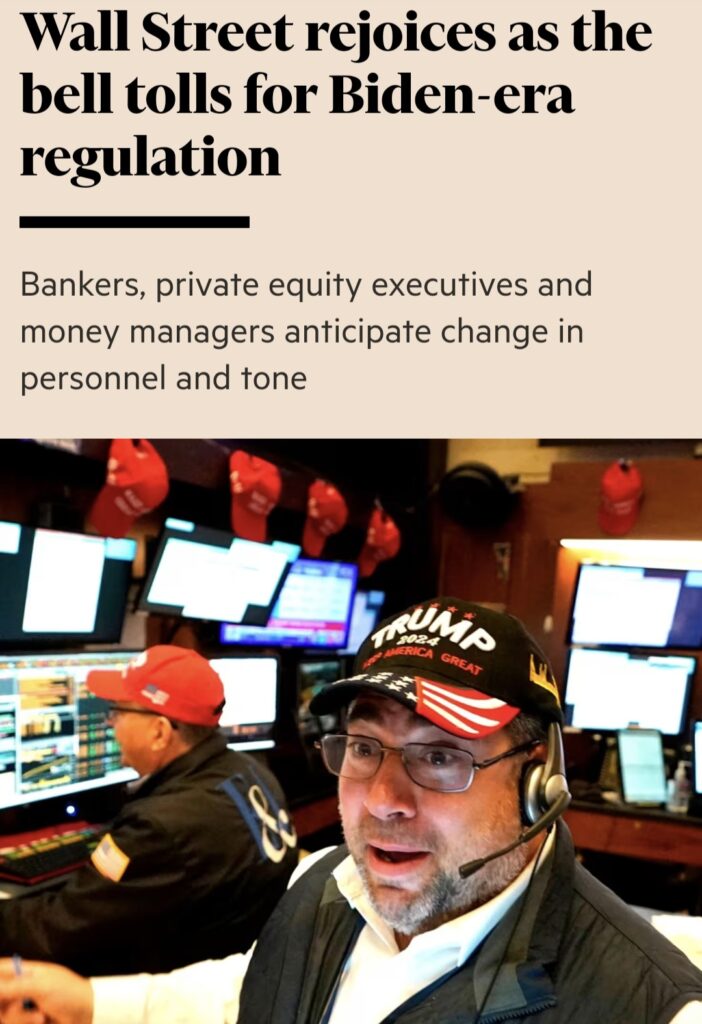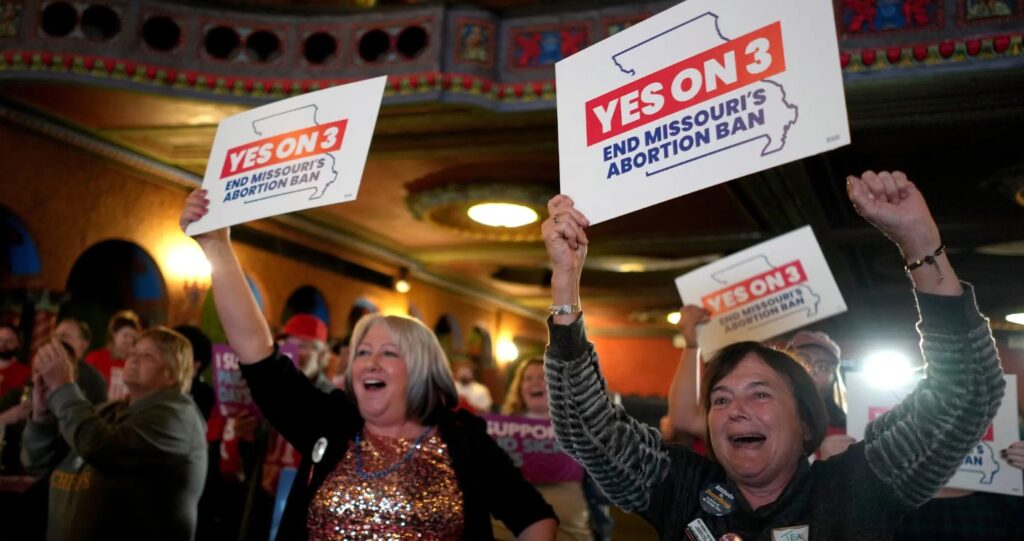 Editorial: the meaning of Trump’s victory
Editorial: the meaning of Trump’s victoryThe election of Donald Trump is a major setback for the interests of the working class in the USA and internationally. Rather than a ‘golden age’ as Trump promised in his victory speech, his elevation to office will be a prelude to intensified class struggles, attacks on living standards and workers’ rights, and internal conflict of a kind not seen since the American Civil War.
On the international plane, Trump’s trajectory will be as erratic and unpredictable as the man himself, but it seems likely that he will double down on US support for Israel in its genocidal war in Gaza, while at the same time he may seek to force Ukraine into an unsatisfactory deal with Putin’s Russia.
That a misogynistic, lying, narcissistic, convicted felon should be elected to the most powerful political office on the planet is an indication of the profound and unprecedented crisis at the heart of the capitalist system. It has been said – correctly – that we live in the most turbulent period in the whole of history, certainly in modern times, and Trump is the living representation of that.
In the heyday of rising of capitalism, that new, dynamic and aspiring class basked in self-confidence, underpinned by a semblance of philosophical justification for its dominance. But today, an utter lack of moral and ethical compass by the capitalist class finds its perfect embodiment in Donald Trump.
The mainstream media is always obsessed with percentage share of the vote – noting that in the large majority of counties and electoral districts, Trump’s vote “went up” in comparison to 2020. What few media outlets have noted, however, is that his vote in absolute numbers declined over those four years, by around a million and a half, from 74.2m to 72.8m.
A monumental rebuke to the Democrats
Trump’s victory is, above all, a monumental rebuke to the Democratic Party, which lost a staggering thirteen million votes in comparison to 2020, falling from 81.3m to 68.1m. [These figures correct at the time of writing]. The Biden administration presided over a fall in living standards, as wages failed to keep up with inflation and the costs of housing.

The result is a rebuke, too, to all those trade union bureaucrats who have backed the Democratic Party uncritically for years, even though it is a party completely wedded to Wall Street and the capitalist system. For Wall Street, the economy under Biden may have been steaming ahead, but for workers it has been stagnating.
It was reported that by 2022, “11% of Americans were living in poverty” but nothing Biden did in his subsequent two years made any difference to that. In the same year, “7.9% of the population lacked health insurance. Healthcare spending per enrollee decreased across Medicare, Medicaid, CHIP (Children’s Health Insurance Programme), and private insurance plans when adjusted for inflation.”
By the end of 2023, the top fifth of income earners held 71% of the nation’s wealth, amounting to approximately $103tn, while workers often worked two jobs to keep their head above water.
A 2024 PRRI (Public Religious Research Institute) survey of American values found that “Seventy-two percent of Americans say they are worried about not having enough money to retire, while more than six in ten say they are worried about being unable to afford health care (65%), housing (64%), everyday expenses such as groceries or gas (61%), or getting a job that pays a living wage (59%)”.
Around a hundred million Americans not motivated to vote
This, then, was the fundamental reason for the collapse of the Democratic Party vote and why around a hundred million Americans were not motivated to vote at all. As candidate and vice-president, Kamala Harris refused to dissociate herself from the actions and policies of the Biden administration, so she was tarred with the same brush.
The Democratic Party will have almost certainly lost millions of young and Muslim voters over its virtually uncritical support for Netanyahu’s war on the people of Gaza. As elsewhere, the USA has seen hundreds of rallies, demonstrations and campus protests over Palestinian rights and this is arguably a bigger movement all-told than the protests against the war in Vietnam in the 1960s and 1970s. The Democrats lost in every single college town in the key state of Michigan, for example, and although we don’t yet have the details, that may have been broadly true in many other states.
But it was above all on living standards and the economy, that Trump succeeded, falsely claiming – like right wing populists the world over – that he is ‘different’ to other politicians and that he is on the side of the ‘little’ person. At every rally he addressed, Trump asked those present if they were better or worse off than they were four years ago, and they answered at the ballot box. Harris’s Hollywood smile, celebrity endorsements and meaningless talk about “joy”, were nothing against the tide of anger on which Trump was able to ride so cynically.

Although the issue of mass immigration featured strongly in the polls – and was the main issue flagged by Trump in all his rallies and propaganda – even this, at bottom, is an economic question. Many workers in the USA, like those in Europe, including Britain, fear that decisions are taken above their heads and without their consent, and they are understandably worried that they are being forced into greater competition for jobs, affordable homes and for dwindling health and other services. Second and third generation Latino immigrants voted in large numbers for Trump precisely because they fear the growing competition for jobs and incomes.
Trump has pledged to deport ten million
Trump pledged in his campaign to round up and deport millions of undocumented migrants, but like his former pledge to ‘build a wall’ on the Mexican border, it is likely to be a policy mired in chaos and disorganisation. It is not clear if the federal government can even build up the resources and an apparatus big enough to deport the ‘ten million’ Trump mentioned.
That said, the labour movement needs to be alert and prepared to defend migrant workers against attacks by police and vigilante squads targetting Black and Latino workers. It is a fundamental class question and workers must defend other workers against harassment by the state and right-wing gangs.
Kamala Harris charged Trump with being a ‘fascist’ in the last week of the election campaign, but that label had no meaning to the overwhelming majority of Trump voters, who, like the four million who voted for Reform UK in Britain in July, are utterly alienated from mainstream politicians, most of whom are personally well-off and seem incapable of understanding the pressures and insecurities of everyday life for workers.
Joe Biden’s popularity in the polls collapsed almost as soon as he was elected in 2020 and he never recovered. We can expect Donald Trump’s popularity to decline just as rapidly in the early part of next year, because although his party will have control of the presidency and (possibly) both houses of Congress, not to mention the Supreme Court, there is no chance at all that the roll-out of his economic policies will favour the big majority of his voters, that is, discontented workers.
It is no accident that the day after his victory, US stocks reached record levels. The rich and super-rich and big corporations are expecting massive tax cuts, as they had after Trump’s first victory in 2016. Trump has proposed cutting corporate tax from 21 per cent to 15 per cent. Spokespersons at BlackRock, the largest fund holder, were purring in the Financial Times, along with just about every other banking analyst, that the Trump win will ‘open the door’ to better times.
Most of the proposed tax cuts will benefit the rich
It has been estimated that his proposed tax cuts will give two thirds of the benefit to the highest-earning fifth of the population, and only one per cent of the benefit to the working class.
As an article on the Gizmodo website put it, “Donald Trump has won the presidency and businesses connected with him and his allies are soaring. According to early financial reports, winners include banks, crypto-related stocks, and private prison companies. All of the worst people in the financial game”.
Anticipating a relaxation of banking regulation and soaring profits, one analyst at Wells Fargo bank told the Financial Times that Trump’s election victory marks a “watershed moment” for the US banking industry. “This is an inflection point,” he said, “a real game-changer.”
Trump’s climate change scepticism is welcome news to the big oil and gas companies. The US shale magnate Harold Hamm, a financial backer of Trump, said the victory was a “monumental win” for America’s oil and gas industry. It would “empower American oil and gas workers to reinforce energy independence for the US and its allies around the world”. In other words, despite the growing evidence of dramatic climatic effects of global warming, Trump will allow the fossil fuel industry to let rip.

Although Trump’s personal inclinations and policies – and even more so, those around him – might be described as ‘pro-fascist’, it is unlikely that his administration will fit that description. Trump will almost certainly attempt to curtail the rights of minorities and workers in general, but how far he succeeds is open to question.
Polls regularly show that most Americans support the right of abortion, but the swing against the Republicans among women voters was not enough to counteract the collapse of the Harris vote. It was still notable that on Tuesday seven out of ten states that voted on it approved amendments to establish or strengthen abortion rights in their state constitutions.
Some states already have draconian anti-trans and anti-abortion laws
As The New York Times reported, “Missouri, which was the first state to officially enact an abortion ban after Roe was overturned in 2022, became the first state where voters ended a ban at the ballot box, with 52 percent approving the measure. A similar amendment passed by 57 percent in Montana, another Republican-controlled state. In two battleground states, Nevada and Arizona, measures to enshrine a right to abortion passed, with more than 60 percent of the vote for each”.
Despite the popular sentiment, however, it is possible that Republican ‘Trumpists’ in many states may try to further limit women’s rights on abortion and the rights of the LBGT community, particularly of trans people. In several states there are already vicious, draconian laws against trans people, to the extent that there is an ongoing ‘exodus’ as they flee from one state to another. Republicans have already drastically limited abortion rights in some states, for example limiting abortion to six weeks and on this issue too, women are having to seek ‘refuge’ in friendly states.
The Trump Republican administration will be instinctively anti-democratic across the board, and that applies no less to trade union rights. However, breaking the industrial power of the unions would not be an easy step to take, because the unions, although they represent overall a minority of workers, still have a considerable social and political weight.

It has also been suggested that Trump will attempt to change the US constitution drastically, perhaps even to give himself the right to stand for a third term. Again, that may be his personal inclination, but whether or not he can move the huge juggernaut of US judicial and electoral tradition is another thing entirely.
Guerrilla war in the courts over federal and state rights
What is certain is that the next four years will be years of turmoil and battles: in terms of industrial struggles, Black and Latino communities struggling against police and state violence, and in battles over attempts to deport migrants. There is likely to be a permanent and ongoing ‘guerrilla war’ over constitutional and legal fronts as states, individuals, and political parties skirmish endlessly through courts and the legal system, at both state and federal level.
It was ostensibly on the ground of ‘states rights’ that the Southern states of US seceded and triggered the Civil War in 1860. Depending on the success of Trump at federal level, it is entirely possible that one feature of the coming four years will be legal struggles over the rights of large Democratic states like California and New York against the policies and powerful interests of the White House and Capitol Hill in Washington DC.
Failure of the labour movement to offer a way forward
Socialists and activists in the USA and internationally are dismayed and perhaps dispirited by the election of Donald Trump. It signals renewed struggles to defend all the rights that workers established over many decades and struggles to defend living standards. There will indeed be a fightback, but the starting point for that must be understanding how and why such a man could be elected to office in the first place.
The prime underlying reason for the election of hypocritical and cynical populists like Trump lies in the failure of the labour movement to offer an alternative. The most important political issue of our time is that of leadership, and to what extent the tops of the labour movement do or do not provide it.
Capitalism is historically redundant; it is a system based more than ever before on the parasitism of a tiny but highly influential minority, whose only aim is self-enrichment. Unless and until the leaders of the labour movement offer a viable alternative – and that means socialist policies, unapologetically challenging the entire basis of the capitalist system – then workers will blindly lash out in any direction, trying to seek a solution. We are living in a period of sharp and dramatic political swings to both right and left.
It is essential that we discuss the issue of how and why leaders like Trump come to be elected. This is because we may see the same process repeated nearer home in the coming years: with Nigel Farage in the UK, Marine Le Pen in France, the AfD in Germany or any other variety of European far-right populists.
[Top picture: graphic from BBC website]
 Editorial: Sunak’s zero-carbon u-turn will not save him - Rishi Sunak may think that he is on a winner rolling back government commitments on zero carbon, but it is not likely to save him,
Editorial: Sunak’s zero-carbon u-turn will not save him - Rishi Sunak may think that he is on a winner rolling back government commitments on zero carbon, but it is not likely to save him, Editorial: Unite needs to campaign inside the Labour Party - It is a very positive step for Sharon Graham, the General Secretary of Unite, to announce that her union is going to use its political
Editorial: Unite needs to campaign inside the Labour Party - It is a very positive step for Sharon Graham, the General Secretary of Unite, to announce that her union is going to use its political Editorial: only militant action will nullify anti-union laws - The latest Tory anti-union law – the Minimum Services Levels Act – coming on top of the Public Order and the Retained EU Law Acts,
Editorial: only militant action will nullify anti-union laws - The latest Tory anti-union law – the Minimum Services Levels Act – coming on top of the Public Order and the Retained EU Law Acts, Editorial: Tories’ abandonment of green polices will cost them - After scraping home in the by-election in Uxbridge, Rishi Sunak thinks he is onto a good thing pretending to be the ‘friend of the motorist’.
Editorial: Tories’ abandonment of green polices will cost them - After scraping home in the by-election in Uxbridge, Rishi Sunak thinks he is onto a good thing pretending to be the ‘friend of the motorist’. Editorial: Five things to note from this week - A number of recent events give some insight into likely developments in the Tory Party and the Labour Party. By-elections always have a smaller turnout
Editorial: Five things to note from this week - A number of recent events give some insight into likely developments in the Tory Party and the Labour Party. By-elections always have a smaller turnout
